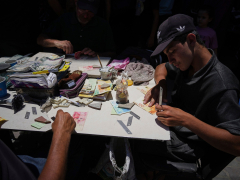You try to buy a kilo of flour in Gaza.
You open your wallet; what’s inside? A faded 10-shekel note, barely held together by a strip of tape. No one wants it; it is all rubbish now.
The 10-shekel note, normally worth about $3, was once the most commonly used bill in daily life. Now, it is no longer in circulation. Not officially—only practically. It has been worn out beyond recognition. Sellers will not accept it. Buyers cannot use it.
There is no fresh cash. No replenishment.
Other banknotes are following the fate of the 10 shekels, especially the smaller ones.
If you pay with a 100-shekel note for an 80-shekel purchase, the seller will likely be unable to return the remaining 20 due to the poor physical state of the banknotes.
Many notes are torn or taped together, and entire stalls now exist just to repair damaged currency so it can be used again. Anything is better than nothing.
But the disintegration of banknotes is not the only problem we have in Gaza.
Civil servants have gone months without pay. NGOs are unable to transfer salaries to their employees. Families cannot send remittances. What once supported Gaza’s financial structure has vanished. There is no mention of when it will return. Just silence.
Money is stuck. Trapped behind closed systems and political barriers.
If you manage to obtain money from outside sources — perhaps from a cousin in Ramallah or a sibling in Egypt — it comes at a cost. A brutal one. If you get sent 1,000 shekels ($300), the agent will hand you 500. That’s right, the commission rate on cash withdrawals in Gaza is now 50 percent.
There are no banks to offer such withdrawals or oversee transfers.
The signs are still there. Bank of Palestine. Cairo Amman Bank. Al Quds Bank. But the doors are shut, the windows are dusty, and the inside is empty. No ATMs work.
There are only brokers, some with connections to the black market and smugglers, who are somehow able to obtain cash. They take huge cuts to dispense it, in exchange for a bank transfer to their accounts.
Every withdrawal feels like theft disguised as a transaction. Even so, people continue to use this system. They have no choi





